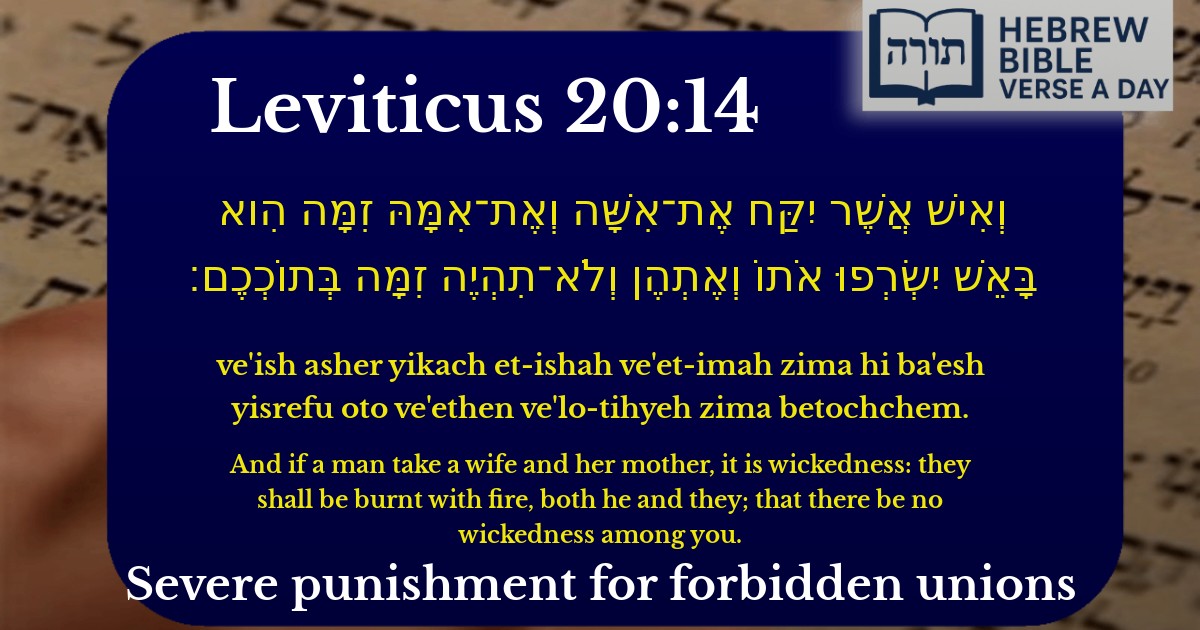Join Our Newsletter To Be Informed When New Videos Are Posted
Join the thousands of fellow Studends who rely on our videos to learn how to read the bible in Hebrew for free!
Hebrew Text
וְאִישׁ אֲשֶׁר יִקַּח אֶת־אִשָּׁה וְאֶת־אִמָּהּ זִמָּה הִוא בָּאֵשׁ יִשְׂרְפוּ אֹתוֹ וְאֶתְהֶן וְלֹא־תִהְיֶה זִמָּה בְּתוֹכְכֶם׃
English Translation
And if a man take a wife and her mother, it is wickedness: they shall be burnt with fire, both he and they; that there be no wickedness among you.
Transliteration
Ve'ish asher yikach et-ishah ve'et-imah zima hi ba'esh yisrefu oto ve'ethen ve'lo-tihyeh zima betochchem.
Hebrew Leining Text
וְאִ֗ישׁ אֲשֶׁ֨ר יִקַּ֧ח אֶת־אִשָּׁ֛ה וְאֶת־אִמָּ֖הּ זִמָּ֣ה הִ֑וא בָּאֵ֞שׁ יִשְׂרְפ֤וּ אֹתוֹ֙ וְאֶתְהֶ֔ן וְלֹא־תִהְיֶ֥ה זִמָּ֖ה בְּתוֹכְכֶֽם׃
וְאִ֗ישׁ אֲשֶׁ֨ר יִקַּ֧ח אֶת־אִשָּׁ֛ה וְאֶת־אִמָּ֖הּ זִמָּ֣ה הִ֑וא בָּאֵ֞שׁ יִשְׂרְפ֤וּ אֹתוֹ֙ וְאֶתְהֶ֔ן וְלֹא־תִהְיֶ֥ה זִמָּ֖ה בְּתוֹכְכֶֽם׃
🎵 Listen to leining
Parasha Commentary
📚 Talmud Citations
This verse is quoted in the Talmud.
📖 Sanhedrin 76a
The verse is discussed in the context of the prohibition against marrying a woman and her mother, emphasizing the severity of the sin and the punishment by burning.
📖 Keritot 3a
The verse is referenced in a discussion about the types of sins that incur the penalty of burning, highlighting the specific case of marrying a woman and her mother.


Prohibition of Marrying a Woman and Her Mother
The verse (Vayikra 20:14) prohibits a man from marrying both a woman and her mother, classifying this act as זִמָּה ("zimah"), a term denoting a particularly severe form of immorality. Rashi explains that this prohibition applies whether the relationships are simultaneous or consecutive, emphasizing the gravity of the transgression. The punishment prescribed—burning by fire—indicates the severity with which the Torah views this violation of family boundaries.
The Nature of the Transgression
Rambam (Hilchos Issurei Bi'ah 1:6) categorizes this prohibition under the laws of forbidden relationships (איסורי עריות), which undermine the sanctity of family structure. The Talmud (Sanhedrin 76a) elaborates that this sin corrupts the natural order, as it introduces jealousy and moral chaos into the family unit. The term זִמָּה is associated with deliberate and brazen immorality, as noted by the Sifra (Kedoshim 10:3).
Punishment and Moral Implications
The punishment of burning (בָּאֵשׁ יִשְׂרְפוּ) is reserved for the most severe offenses. The Ramban explains that this method of execution symbolizes the complete eradication of such behavior from the community. The concluding phrase, "וְלֹא־תִהְיֶה זִמָּה בְּתוֹכְכֶם" ("that there be no wickedness among you"), underscores the communal responsibility to uphold moral standards, as highlighted by the Meshech Chochmah.
Broader Context in Jewish Law